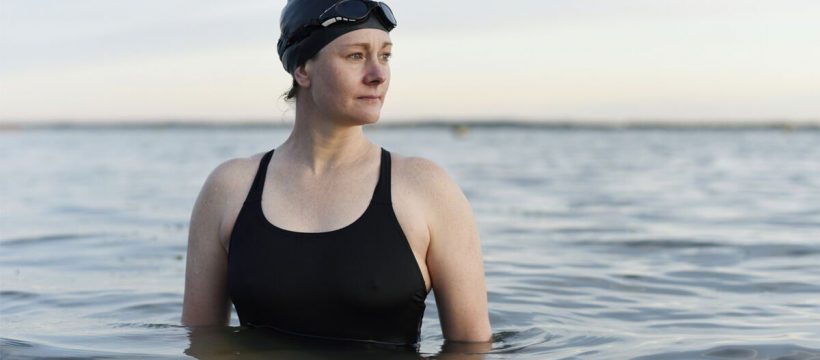EU expresses concern over UK release of raw sewage into the sea
Sea swimming has long been considered an activity good for your health, with research showing it has benefits for both your mental and physical wellbeing.
However, with increasing reports that the water at certain beaches in the UK is contaminated due to pollution, one doctor has warned of the various illnesses you could be at risk of.
Speaking exclusively with Express.co.uk, Doctor Deborah Lee from the Dr Fox Online Pharmacy, said: “The sea becomes polluted when run-off rainwater and untreated sewage are released into the seawater and it becomes contaminated with pathogenic organisms – germs that are harmful to human health.
“Untreated sewage is liquid waste containing human faeces, literally teeming with bacteria and viruses. It could also be farm waste, carrying microorganisms from pigs, sheep, cows and chickens and their excrement.
“The highest concentration of microbes will be at the site where the spill went into the water. Sea pollution is also caused by litter and animal excrement left behind on beaches.”
READ MORE UK town plagued by foul smell of raw sewage which has ‘ruined’ residents’ summer

What illnesses could we be exposed to?
Dr Lee explained that more than 100 pathogenic viruses are found in human and animal faeces.
“As a result of sewage dumping, these find their way into seawater, estuaries, and rivers. Any of these pathogens can cause illness in humans,” she said.
“The most common cause of illness in humans are coliform bacteria and enteroviruses.
“Dumping waste in the sea means it becomes a cocktail of pathogens. Some specific strains of coliforms (E.coli) produce toxins which cause hemorrhagic enterocolitis and haemolytic uraemic syndrome.
Don’t miss…
Water companies face paying out millions over seaside sewage allegations[LATEST]
True scale of sewage horror emerges as water firms admit polluting for DECADES[INSIGHT]
Every beach at risk of sewage overflow — check your area here[INFORMER]

We use your sign-up to provide content in ways you’ve consented to and to improve our understanding of you. This may include adverts from us and 3rd parties based on our understanding. You can unsubscribe at any time. More info
“Enteroviruses, noroviruses, adenovirus, coxsackie virus, poliovirus, rotavirus and hepatitis A viruses are all found in polluted seawater.
“Salmonella, clostridium, klebsiella, and giardia are also present – and all can cause gastroenteritis.
“Cyanobacteria are blue-green algae found in seawater that are toxic, also causing diarrhoea and vomiting, headaches, muscle and joint pain.”
She warned of the following illnesses and their symptoms to look out for:
- Gastroenteritis – tummy pain, sickness and diarrhoea, which when severe can lead to dehydration and collapse
- Hepatitis – hepatitis A causes pain in the upper right part of the tummy, loss of appetite, nausea, vomiting, and yellow jaundice with yellowy skin and eyes, pale stools and dark-coloured urine
- Meningitis – coxsackie virus can cause meningitis, hand foot and mouth disease, and conjunctivitis
- Respiratory infections – colds and flu-like illnesses, infections of the inner and outer ear, throat infections, and chest infections
- Eye infections – conjunctivitis, keratitis
- Skin disease – cercarial dermatitis (swimmer’s itch) is a rash caused by an allergic reaction to the larvae of a parasitic flatworm, which can be acquired from swimming in contaminated water.

She said: “Look out for symptoms which come on soon – often within a few hours – of swimming in the sea.
“The most common symptoms are tummy pain, feeling sick, being sick, diarrhoea, a skin rash, a sore throat, sore ears, cough or cold, flu-like symptoms, or pink eye.”
Which beaches in the UK are particularly bad for swimming?
The Environment Agency, which monitors water quality at UK beaches, advises against swimming at the following beaches in England:
- St Mary’s Bay, Kent
- Bognor Regis, West Sussex
- Lyme Regis Church Cliff Beach, Dorset
- Watcombe, Devon
- Dunster Beach, Devon
- Instow, Cornwall
- Rock Beach, Cornwall
- Ilfracombe, Devon
- Burnham Jetty North, Somerset
- Weston-super-Mare Sand Bay, Somerset
- Weston Main, Somerset
- Wolvercote Mill Stream, Oxfordshire
- Blackpool North, Lancashire
- Wharfe at Cromwell, Yorkshire
- Tunstall, Yorkshire
- Scarborough South Bay, Yorkshire
- Bridlington South Beach, Yorkshire
- Tynemouth Cullercoats, Tyneside
- Heacham, Norfolk
- Allonby South, Cumbria
- Silloth, Cumbria
- Clacton, Essex.
In comparison, according to businesswaste.co.uk, the top 10 beaches for swimming in the UK (based on their levels of E.coli in the water) are:
- Treyarnon Bay, Cornwall
- Shell Bay, Dorset
- Kimmeridge Bay, Dorset
- Kennack Sands, Cornwall
- Durdle Door East, Dorset
- Constantine Bay, Cornwall
- Combesgate Beach, Devon
- Church Cove, Cornwall
- Poole Shore Road Beach, Dorset
- Praa Sands East, Cornwall.
Dr Lee added: “Unfortunately, the risk of acquiring an infection from swimming in the sea is very real.
“Surfers Against Sewage conducted a survey in May 2022. They found that over 50 percent of those who had participated in wild water and open water swimming had become unwell.
“By far and away the most common illness was gastroenteritis, but ear, nose and throat infections, viral illnesses, respiratory conditions and skin rashes were also common.
“Before you go for a swim in the sea, it’s best to check the quality of the water by checking on the Department for the Environment Food and Rural Affairs website.
“When you arrive at the beach, look for the blue flag which should ensure the water is safe. Look for safety notices and don’t swim if there is a warning not to do so.”
Source: Read Full Article
